 Don't be fooled: this isn't some silly pot-worshipping reggae groupcome to praise the benefits of marijuana use to the masses. This is abody-swaying group of musicians fusing "acoustic" reggae with the bestelements of dub. The sexiest horn combo this side of the universe blowsthrough "Kneel At the Feet" and slithers through a sax solo hell-benton turning these cold days into humid, fire-lit nights in a steamy bar.There's the moon shining over the mountains just outside the openwindow of the bar and the smell of salt-water splashes up through mysenses with every drum POP! and guitar stroke. The music isn't justsexy, though: 10 Ft. Ganja Plant recalls the best of classic reggaewith upbeat and playful rhythms, bass-led melodies, and, especially inthe case of "Let the Music Hit," outstanding lyrics celebrating thepower of great reggae tunes. The best part is that each track soundsdistinctly different: the production is never the same between twotracks and all the instruments have a unique voice that bursts away andstands alone as a shining beacon. If that beacon isn't shining, though,it's pulsing and moving like the waves on the ocean: it's hard not totap a foot or get caught up in the melodies. With each track being asurprise both musically and production-wise, it's an album that movesalong quickly and leaves a hunger for more. The chiming, foreign, andexotic "Midnight Landing" stands out like a lone dancer on the beach:the strange bells used that form the center of the melody couldn't bemore whimsical and yet they stand at a paradox: they're a sharpcontrast from standard reggae instrumentation but they keep in focuswith the soul of the album. I could spend hours talking about theimagery this album throws at me every time I listen to it. I don'tthink I've ever heard a reggae/dub album quite as diverse as this. Infact, even putting a name like "reggae/dub" on Midnight Landing is unfair: this isn't just reggae or dub and this isn't justsome combination of the two. Between the vocal-pieces and theinstrumentals there is an amazing variety of styles employed and it'shard not to stand back and look at it all and wonder: this is one ofthe most creative albums I've heard all year. It's diverse, fun, risky,experimental, creative, and entirely unique. This goes beyond itsstylistic marker and shatters into something entirely new and beautifulwithout forgetting where it came from.
Don't be fooled: this isn't some silly pot-worshipping reggae groupcome to praise the benefits of marijuana use to the masses. This is abody-swaying group of musicians fusing "acoustic" reggae with the bestelements of dub. The sexiest horn combo this side of the universe blowsthrough "Kneel At the Feet" and slithers through a sax solo hell-benton turning these cold days into humid, fire-lit nights in a steamy bar.There's the moon shining over the mountains just outside the openwindow of the bar and the smell of salt-water splashes up through mysenses with every drum POP! and guitar stroke. The music isn't justsexy, though: 10 Ft. Ganja Plant recalls the best of classic reggaewith upbeat and playful rhythms, bass-led melodies, and, especially inthe case of "Let the Music Hit," outstanding lyrics celebrating thepower of great reggae tunes. The best part is that each track soundsdistinctly different: the production is never the same between twotracks and all the instruments have a unique voice that bursts away andstands alone as a shining beacon. If that beacon isn't shining, though,it's pulsing and moving like the waves on the ocean: it's hard not totap a foot or get caught up in the melodies. With each track being asurprise both musically and production-wise, it's an album that movesalong quickly and leaves a hunger for more. The chiming, foreign, andexotic "Midnight Landing" stands out like a lone dancer on the beach:the strange bells used that form the center of the melody couldn't bemore whimsical and yet they stand at a paradox: they're a sharpcontrast from standard reggae instrumentation but they keep in focuswith the soul of the album. I could spend hours talking about theimagery this album throws at me every time I listen to it. I don'tthink I've ever heard a reggae/dub album quite as diverse as this. Infact, even putting a name like "reggae/dub" on Midnight Landing is unfair: this isn't just reggae or dub and this isn't justsome combination of the two. Between the vocal-pieces and theinstrumentals there is an amazing variety of styles employed and it'shard not to stand back and look at it all and wonder: this is one ofthe most creative albums I've heard all year. It's diverse, fun, risky,experimental, creative, and entirely unique. This goes beyond itsstylistic marker and shatters into something entirely new and beautifulwithout forgetting where it came from.  Don't be fooled: this isn't some silly pot-worshipping reggae groupcome to praise the benefits of marijuana use to the masses. This is abody-swaying group of musicians fusing "acoustic" reggae with the bestelements of dub. The sexiest horn combo this side of the universe blowsthrough "Kneel At the Feet" and slithers through a sax solo hell-benton turning these cold days into humid, fire-lit nights in a steamy bar.There's the moon shining over the mountains just outside the openwindow of the bar and the smell of salt-water splashes up through mysenses with every drum POP! and guitar stroke. The music isn't justsexy, though: 10 Ft. Ganja Plant recalls the best of classic reggaewith upbeat and playful rhythms, bass-led melodies, and, especially inthe case of "Let the Music Hit," outstanding lyrics celebrating thepower of great reggae tunes. The best part is that each track soundsdistinctly different: the production is never the same between twotracks and all the instruments have a unique voice that bursts away andstands alone as a shining beacon. If that beacon isn't shining, though,it's pulsing and moving like the waves on the ocean: it's hard not totap a foot or get caught up in the melodies. With each track being asurprise both musically and production-wise, it's an album that movesalong quickly and leaves a hunger for more. The chiming, foreign, andexotic "Midnight Landing" stands out like a lone dancer on the beach:the strange bells used that form the center of the melody couldn't bemore whimsical and yet they stand at a paradox: they're a sharpcontrast from standard reggae instrumentation but they keep in focuswith the soul of the album. I could spend hours talking about theimagery this album throws at me every time I listen to it. I don'tthink I've ever heard a reggae/dub album quite as diverse as this. Infact, even putting a name like "reggae/dub" on Midnight Landing is unfair: this isn't just reggae or dub and this isn't justsome combination of the two. Between the vocal-pieces and theinstrumentals there is an amazing variety of styles employed and it'shard not to stand back and look at it all and wonder: this is one ofthe most creative albums I've heard all year. It's diverse, fun, risky,experimental, creative, and entirely unique. This goes beyond itsstylistic marker and shatters into something entirely new and beautifulwithout forgetting where it came from.
Don't be fooled: this isn't some silly pot-worshipping reggae groupcome to praise the benefits of marijuana use to the masses. This is abody-swaying group of musicians fusing "acoustic" reggae with the bestelements of dub. The sexiest horn combo this side of the universe blowsthrough "Kneel At the Feet" and slithers through a sax solo hell-benton turning these cold days into humid, fire-lit nights in a steamy bar.There's the moon shining over the mountains just outside the openwindow of the bar and the smell of salt-water splashes up through mysenses with every drum POP! and guitar stroke. The music isn't justsexy, though: 10 Ft. Ganja Plant recalls the best of classic reggaewith upbeat and playful rhythms, bass-led melodies, and, especially inthe case of "Let the Music Hit," outstanding lyrics celebrating thepower of great reggae tunes. The best part is that each track soundsdistinctly different: the production is never the same between twotracks and all the instruments have a unique voice that bursts away andstands alone as a shining beacon. If that beacon isn't shining, though,it's pulsing and moving like the waves on the ocean: it's hard not totap a foot or get caught up in the melodies. With each track being asurprise both musically and production-wise, it's an album that movesalong quickly and leaves a hunger for more. The chiming, foreign, andexotic "Midnight Landing" stands out like a lone dancer on the beach:the strange bells used that form the center of the melody couldn't bemore whimsical and yet they stand at a paradox: they're a sharpcontrast from standard reggae instrumentation but they keep in focuswith the soul of the album. I could spend hours talking about theimagery this album throws at me every time I listen to it. I don'tthink I've ever heard a reggae/dub album quite as diverse as this. Infact, even putting a name like "reggae/dub" on Midnight Landing is unfair: this isn't just reggae or dub and this isn't justsome combination of the two. Between the vocal-pieces and theinstrumentals there is an amazing variety of styles employed and it'shard not to stand back and look at it all and wonder: this is one ofthe most creative albums I've heard all year. It's diverse, fun, risky,experimental, creative, and entirely unique. This goes beyond itsstylistic marker and shatters into something entirely new and beautifulwithout forgetting where it came from.  Like the 23Five label's recent success, Variable Resistance: Ten Hours of Sound from Australia, this new two-disc compilation from Preservation seeks to document a burgeoning sound art/experimental electronic scene among Australian musicians. "Scene," however, may be inappropriate given the variety available here. Motion: Movement in Australian Sound does distinguish itself by veering (slightly) away from headier sound art pieces into a more repeated-listener-friendly zone.
Like the 23Five label's recent success, Variable Resistance: Ten Hours of Sound from Australia, this new two-disc compilation from Preservation seeks to document a burgeoning sound art/experimental electronic scene among Australian musicians. "Scene," however, may be inappropriate given the variety available here. Motion: Movement in Australian Sound does distinguish itself by veering (slightly) away from headier sound art pieces into a more repeated-listener-friendly zone.
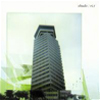 This is a mysterious piece of music. At times rising above nothing morethan a series of simplistic drum patterns and a possessed guitar, theeffect is radiates is eerie and strange. It's as if the wholearchitecture that the sound rested upon was made up of a liquid masssubject to change at anytime. Symphonic washes of melody that soundadrift on the sea are meshed with the sound of metal or wood beingground into a pulp and then recycled into a series of hypnotic rhythmsthat move each track along in a soft but drunken manner. On a tracklike "Random Hiver" the spectacular residue of this combination isnothing short of enchanting, but the hollow and vaccuous halls of soundsometimes become too plain and uninvolving. This is especially true forthe middle third of the album. Vocals samples are used early on in goodtaste to provide a sense of voyeurism within the music, but in themiddle portion of RI.Tit just serves to stretch out tracks that weren't meant to be stretchedout. "Aritec" and "We Watch Over You" are both far too alike to beenjoyable back to back. If it weren't for "Random Hiver," I might havebecome sick with the album too soon and missed the promisingconclusion. A series of sucking sounds (think snot) lead "We Watch OverYou" into "Cheyenne," a tune that creates an empty and strange embracebetween keyboards and drums. The drums never quite sync up witheachother nor with the self-destructing melodies fading and buzzing outof the sound spectrum. The end of the song is a mess of alien sound andinstellar noise that dissipates into thin air before the escapist"Enron State" topples into being and blows itself out on its own gustof wind. Yes, the song has a bit of a political tint to it, butnevermind such a distraction: the music is lovely. The end leaves mefeeling lonely and somehow depressed: the entire album just feels likea byzantine cathedral that echoes to the point discomfort. It'sgorgeous, without a doubt, but there's something about that void thatis unsettling; it's a space that's hard to look into without beingabsorbed by it.
This is a mysterious piece of music. At times rising above nothing morethan a series of simplistic drum patterns and a possessed guitar, theeffect is radiates is eerie and strange. It's as if the wholearchitecture that the sound rested upon was made up of a liquid masssubject to change at anytime. Symphonic washes of melody that soundadrift on the sea are meshed with the sound of metal or wood beingground into a pulp and then recycled into a series of hypnotic rhythmsthat move each track along in a soft but drunken manner. On a tracklike "Random Hiver" the spectacular residue of this combination isnothing short of enchanting, but the hollow and vaccuous halls of soundsometimes become too plain and uninvolving. This is especially true forthe middle third of the album. Vocals samples are used early on in goodtaste to provide a sense of voyeurism within the music, but in themiddle portion of RI.Tit just serves to stretch out tracks that weren't meant to be stretchedout. "Aritec" and "We Watch Over You" are both far too alike to beenjoyable back to back. If it weren't for "Random Hiver," I might havebecome sick with the album too soon and missed the promisingconclusion. A series of sucking sounds (think snot) lead "We Watch OverYou" into "Cheyenne," a tune that creates an empty and strange embracebetween keyboards and drums. The drums never quite sync up witheachother nor with the self-destructing melodies fading and buzzing outof the sound spectrum. The end of the song is a mess of alien sound andinstellar noise that dissipates into thin air before the escapist"Enron State" topples into being and blows itself out on its own gustof wind. Yes, the song has a bit of a political tint to it, butnevermind such a distraction: the music is lovely. The end leaves mefeeling lonely and somehow depressed: the entire album just feels likea byzantine cathedral that echoes to the point discomfort. It'sgorgeous, without a doubt, but there's something about that void thatis unsettling; it's a space that's hard to look into without beingabsorbed by it.samples:
 Vienna's Vegetable Orchestra is one of only two vegetable musicprojects worldwide. They make music using only instruments crafted outof vegetables and various kitchen appliances. No sampling or looping isinvolved, and all songs are composed for live performance, the soundsgathered by what must be some of the best contact microphones in theworld. The group protests that this is no "just-for-fun project," andsuch a claim is easy to believe after listening to this, their secondfull-length release. Trying to decide just how this record, soundinglike a nice enough mix of spacious glitch-tronica and the windblown,percussive sound of early Kraftwerk, was rended from curiously alteredradishes, carrots, and eggplant, is at least a unique experience. Theorchestra's stated goal is "the interpretation and reconstruction ofelectronic music with organic means," the first part of which is anastounding achievement. With the aid of microphones alone, anincredible range of drone, crackle, and even straight noise travels theshort distance from vegetable to ear. They do house; they do dub; hell,they even cover Kraftwerk's "Radioactivity" with an amazing amount ofclarity. The large number of sounds and reference points within Automatekeep the novelty cooking for far longer than one would expect. Thealbum falters, however, in accomplishing the "reconstruction" proposedin its concept. True, the element of surprise enters first as therealization sets in that these are all vegetable sounds, then againwhen it's clear that none of the sounds have been run through computersor looped. But the music, taken alone, is nothing shocking. Somestrange, noticeably unique sounds emerge every now and then throughout Automate,but no archly organic vibe is launched. In a time when computers canreconstruct and often augment any sound under the sun, vegetables thatmerely replicate computer noise, and do so somewhat derivatively, failto make a lasting impression. That said, the Vegetable Orchestra'sfirst album may not be directed at a reinterpretation of electronicmusic, and therefore may not find the same shortcomings as itssuccessor. Also, the orchestra's bimonthly performances are surelyspectacles to be reckoned with; at the end of the show, the group's ownchef cooks the instruments into a soup that is shared with theaudience!
Vienna's Vegetable Orchestra is one of only two vegetable musicprojects worldwide. They make music using only instruments crafted outof vegetables and various kitchen appliances. No sampling or looping isinvolved, and all songs are composed for live performance, the soundsgathered by what must be some of the best contact microphones in theworld. The group protests that this is no "just-for-fun project," andsuch a claim is easy to believe after listening to this, their secondfull-length release. Trying to decide just how this record, soundinglike a nice enough mix of spacious glitch-tronica and the windblown,percussive sound of early Kraftwerk, was rended from curiously alteredradishes, carrots, and eggplant, is at least a unique experience. Theorchestra's stated goal is "the interpretation and reconstruction ofelectronic music with organic means," the first part of which is anastounding achievement. With the aid of microphones alone, anincredible range of drone, crackle, and even straight noise travels theshort distance from vegetable to ear. They do house; they do dub; hell,they even cover Kraftwerk's "Radioactivity" with an amazing amount ofclarity. The large number of sounds and reference points within Automatekeep the novelty cooking for far longer than one would expect. Thealbum falters, however, in accomplishing the "reconstruction" proposedin its concept. True, the element of surprise enters first as therealization sets in that these are all vegetable sounds, then againwhen it's clear that none of the sounds have been run through computersor looped. But the music, taken alone, is nothing shocking. Somestrange, noticeably unique sounds emerge every now and then throughout Automate,but no archly organic vibe is launched. In a time when computers canreconstruct and often augment any sound under the sun, vegetables thatmerely replicate computer noise, and do so somewhat derivatively, failto make a lasting impression. That said, the Vegetable Orchestra'sfirst album may not be directed at a reinterpretation of electronicmusic, and therefore may not find the same shortcomings as itssuccessor. Also, the orchestra's bimonthly performances are surelyspectacles to be reckoned with; at the end of the show, the group's ownchef cooks the instruments into a soup that is shared with theaudience!samples:
 If brevity is the soul of wit, then the 99 remixes of Cock ESP on Hurts So Goodmust be the wittiest music ever produced. Close to none of these songsexceed the two-minute mark, most of them averaging about 30-45 seconds.It's an album tailor made for noise lovers with ADD. Cock ESP isanother one of those aggro-noise outfits with a wicked sense of humorand a predilection for transgressive fun. V/VM Test records iscertainly an appropriate label for this stuff, as much of their humorderives from brutal parodies of pop music and pun-filled song titles,poking fun at pop culture clichés and other easy targets. Thisadolescent satire has the potential to wear out its welcome quickly,but when it comes in such tiny little disposable half-minute packages,it's hard to resist. Just reading down the list of the 88 band namesand 99 song titles that make up the album is a fucking riot. A samplingof some of the more ridiculous band names: The Edible Scab Package, DJEnormous Genitals, U Can Unlearn Guitar, Obscuration/Albee Featuringthe Mellow Oaks First Grade Choir, Uncle Fatso, Kid666 and DJSmallcock. The song titles: "Don't Stop Bleedin'," "The Pursuit ofCrappiness," "Enjoy the Violence," and "Hologram of Balls." The musicruns the gamut — mutated voices, perversions of pop music, sampledmedia cut-ups, harsh blasts of industrial noise, aggressive drill n'bass techno, clarinet solos, a children's choir, field recordings anddrugged-up fucking about — some of it hilarious, all of it annoying,but certainly that was the intention. As an unexpected side effect,listening to this disc on random repeat mode all afternoon has given methe strange ability to read the minds of people's genitals. In fact,your dick just told me that it wants this CD. -
If brevity is the soul of wit, then the 99 remixes of Cock ESP on Hurts So Goodmust be the wittiest music ever produced. Close to none of these songsexceed the two-minute mark, most of them averaging about 30-45 seconds.It's an album tailor made for noise lovers with ADD. Cock ESP isanother one of those aggro-noise outfits with a wicked sense of humorand a predilection for transgressive fun. V/VM Test records iscertainly an appropriate label for this stuff, as much of their humorderives from brutal parodies of pop music and pun-filled song titles,poking fun at pop culture clichés and other easy targets. Thisadolescent satire has the potential to wear out its welcome quickly,but when it comes in such tiny little disposable half-minute packages,it's hard to resist. Just reading down the list of the 88 band namesand 99 song titles that make up the album is a fucking riot. A samplingof some of the more ridiculous band names: The Edible Scab Package, DJEnormous Genitals, U Can Unlearn Guitar, Obscuration/Albee Featuringthe Mellow Oaks First Grade Choir, Uncle Fatso, Kid666 and DJSmallcock. The song titles: "Don't Stop Bleedin'," "The Pursuit ofCrappiness," "Enjoy the Violence," and "Hologram of Balls." The musicruns the gamut — mutated voices, perversions of pop music, sampledmedia cut-ups, harsh blasts of industrial noise, aggressive drill n'bass techno, clarinet solos, a children's choir, field recordings anddrugged-up fucking about — some of it hilarious, all of it annoying,but certainly that was the intention. As an unexpected side effect,listening to this disc on random repeat mode all afternoon has given methe strange ability to read the minds of people's genitals. In fact,your dick just told me that it wants this CD. - - Madame Chao - Hologram of Balls (Horrorglam of Bars Mix)
- DJ Enormous Genitals - Don't Stop Bleedin' (Enormous Cock Mix)
- Arctic Universe - Too Good To Be Experimental (Ten Below Mix)
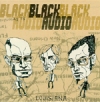 The future of indie rock mixed with electrorock funk is definitely indoubt. Black Audio are a Finnish pop outfit with a mission to be thebest club band ever, or so it seems listening to their slickproductions on this release. The sad thing is that their beats arederivative, and every track is ruined by the mispronunciation of aword, or a strange effect that throws everything out of balance. Thereis a lot of creativity in their music, no question there, but it hasvery little substance that can be called originality. This single,composed of one undisturbed track off their debut album and two remixedversions of album tracks, is enough to give a taste of the band andtheir flavor, but there is precious little here that would give me anycause to want to listen to their full-length at all. "Louisiana" iskeyboard funk with scratch guitar and a steady programmed beat, butit's crippled by the flatulent keyboard bassline, and the repeatedphrasing of "Yamaha" as "Ya-MAH-ha." "Rock 'N' Roll Egos" starts offfairly strong, with a labored rhythm and guitar bend, but it's thelyrics that ultimately do this one in, as well: "Yeah I hate therednecks, dislike hipsters even more/Getting along with mean morons forthe sake of business makes me a whore." It just shows that subjectmatter only gets you halfway there; next you have to carry the conceptto the masses on your words and feelings. Maybe something is lost inthe translation here, and that's part of the problem. "Mockba 1980" isa tribute to Finnish Olympic medal winners of the past, but the remixhere just plods at first, then annoys at the end with its blandkeyboard sounds and rapid-fire for no reason beat. It's a good attempt,and maybe there would be more on the full-length for me to enjoy. Withthis as an appetizer, though, I have very little stomach for the maincourse.
The future of indie rock mixed with electrorock funk is definitely indoubt. Black Audio are a Finnish pop outfit with a mission to be thebest club band ever, or so it seems listening to their slickproductions on this release. The sad thing is that their beats arederivative, and every track is ruined by the mispronunciation of aword, or a strange effect that throws everything out of balance. Thereis a lot of creativity in their music, no question there, but it hasvery little substance that can be called originality. This single,composed of one undisturbed track off their debut album and two remixedversions of album tracks, is enough to give a taste of the band andtheir flavor, but there is precious little here that would give me anycause to want to listen to their full-length at all. "Louisiana" iskeyboard funk with scratch guitar and a steady programmed beat, butit's crippled by the flatulent keyboard bassline, and the repeatedphrasing of "Yamaha" as "Ya-MAH-ha." "Rock 'N' Roll Egos" starts offfairly strong, with a labored rhythm and guitar bend, but it's thelyrics that ultimately do this one in, as well: "Yeah I hate therednecks, dislike hipsters even more/Getting along with mean morons forthe sake of business makes me a whore." It just shows that subjectmatter only gets you halfway there; next you have to carry the conceptto the masses on your words and feelings. Maybe something is lost inthe translation here, and that's part of the problem. "Mockba 1980" isa tribute to Finnish Olympic medal winners of the past, but the remixhere just plods at first, then annoys at the end with its blandkeyboard sounds and rapid-fire for no reason beat. It's a good attempt,and maybe there would be more on the full-length for me to enjoy. Withthis as an appetizer, though, I have very little stomach for the maincourse. Rune Grammofon is known for releasing consistently excellent recordswhile at the same time convincing listeners that all their music comesfrom Norway. One would think, given the output of this label alone,Norway should have long ago become the new Iceland…or something. Rune'sreputation for continually thwarting audience expectations will not betarnished by Fevergreens,the second release from outsider-composer Jono El Grande. Next to ArneNordheim's abstract electronics, Supersilent's dead-city jazz, andSpunk's inimitable improv, Fevergreens occupies a territory ofits own; problem is, the territory isn't so thrillingly exclusive thistime around. While El Grande's playful blend of easy listening,exotica, and soundtrack styling may stand out in Norway, there is a"tried" quality to this music that makes the disc less than impressive.Fevergreens is enjoyable; the exuberance of these tracks iscertainly palpable, the pathos-ridden moments gripping even. ElGrande's forays into easy listening and a kind of quasi-exotica arewritten well, never drifting into (more-than-appropriate) parody. Thedisc fails, somewhat admirably, in its ambitious nature. The musicoperates under a classically informed, theatrical guise, bookendingprologue/epilogue sections and all, with the soundtrack-influenced vibefueling the listener's vivid journey through the crests and denouementsof an elaborate, though abstract tale. Such a framework clashes with ElGrande's interest in jazz and the progressive rock sound bearing themark of people like the Mothers of Invention and Henry Cow. The avantpresence is subtle, isolated to bursts of rock drumming, spasticsynthesized melodies, and a more pronounced jazz edge, but relevantenough to pull the stoicism out from under what would otherwise be arather refined musical achievement. The short lengths of the songs,each packed with enough mood changes to make one's head spin, likewisedetract from the latent seductive quality of this music. I find myselfwishing the avant-rockist bits were allowed to flail and degeneratefreely, or the moments of a more classical resolve given more room tobreathe. The former would provide Jono El Grande a welcome (and stillunique) spot on Rune Grammafon's intimidating roster, while the latterwould still make him the best Norwegian making such interesting music(which, to be honest, could mean the best worldwide).
Rune Grammofon is known for releasing consistently excellent recordswhile at the same time convincing listeners that all their music comesfrom Norway. One would think, given the output of this label alone,Norway should have long ago become the new Iceland…or something. Rune'sreputation for continually thwarting audience expectations will not betarnished by Fevergreens,the second release from outsider-composer Jono El Grande. Next to ArneNordheim's abstract electronics, Supersilent's dead-city jazz, andSpunk's inimitable improv, Fevergreens occupies a territory ofits own; problem is, the territory isn't so thrillingly exclusive thistime around. While El Grande's playful blend of easy listening,exotica, and soundtrack styling may stand out in Norway, there is a"tried" quality to this music that makes the disc less than impressive.Fevergreens is enjoyable; the exuberance of these tracks iscertainly palpable, the pathos-ridden moments gripping even. ElGrande's forays into easy listening and a kind of quasi-exotica arewritten well, never drifting into (more-than-appropriate) parody. Thedisc fails, somewhat admirably, in its ambitious nature. The musicoperates under a classically informed, theatrical guise, bookendingprologue/epilogue sections and all, with the soundtrack-influenced vibefueling the listener's vivid journey through the crests and denouementsof an elaborate, though abstract tale. Such a framework clashes with ElGrande's interest in jazz and the progressive rock sound bearing themark of people like the Mothers of Invention and Henry Cow. The avantpresence is subtle, isolated to bursts of rock drumming, spasticsynthesized melodies, and a more pronounced jazz edge, but relevantenough to pull the stoicism out from under what would otherwise be arather refined musical achievement. The short lengths of the songs,each packed with enough mood changes to make one's head spin, likewisedetract from the latent seductive quality of this music. I find myselfwishing the avant-rockist bits were allowed to flail and degeneratefreely, or the moments of a more classical resolve given more room tobreathe. The former would provide Jono El Grande a welcome (and stillunique) spot on Rune Grammafon's intimidating roster, while the latterwould still make him the best Norwegian making such interesting music(which, to be honest, could mean the best worldwide). 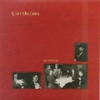 Those familiar with Electrelane may not recognize them now. Wherebefore they were apt to formulate long, dire instrumentals with murkybass, flamboyant keyboards, and fuzz guitar, these four ladies fromBrighton have apparently decided that less can be more, provided that the energy is right. On Paradeis a sample of what's to come from the band on their debut full-lengthon Too Pure, and has an intriguing concept given their past. Threesongs weighing it at a little past eight minutes is a little shocking.The Bruce Springsteen cover ups the oddity level, though they've playedit live in the past with good notices. But the punk-injected soundtakes the taco, as the Electrelane of before has been replaced by thebastard daughter of Snowpony and Sleater-Kinney (recent tourmates =coincidence?). At any rate, it's a fairly by-the-numbers EP: new soundon track one, strangely appealing though out of character cover ontrack two, and a more traditional-sounding (read: instrumental) trackthree to prove to fans they haven't completely lost their minds. It'sfairly mediocre, but not in that it-almost-stinks kind of way. It'sjust nothing all that special. Verity Susman has that husky JohnetteNapolitano quality in her voice that always sounds like it can't domuch more than it is right now. The music is catchy and has a certainulterior groove to speak of, but at the end of the day I'm left wantingto give it all the old heave-ho on days when I want to trade in old CDsfor new at my local. The jury's not out so far that I wouldn't listento the forthcoming debut, but I'm suspect nonetheless.
Those familiar with Electrelane may not recognize them now. Wherebefore they were apt to formulate long, dire instrumentals with murkybass, flamboyant keyboards, and fuzz guitar, these four ladies fromBrighton have apparently decided that less can be more, provided that the energy is right. On Paradeis a sample of what's to come from the band on their debut full-lengthon Too Pure, and has an intriguing concept given their past. Threesongs weighing it at a little past eight minutes is a little shocking.The Bruce Springsteen cover ups the oddity level, though they've playedit live in the past with good notices. But the punk-injected soundtakes the taco, as the Electrelane of before has been replaced by thebastard daughter of Snowpony and Sleater-Kinney (recent tourmates =coincidence?). At any rate, it's a fairly by-the-numbers EP: new soundon track one, strangely appealing though out of character cover ontrack two, and a more traditional-sounding (read: instrumental) trackthree to prove to fans they haven't completely lost their minds. It'sfairly mediocre, but not in that it-almost-stinks kind of way. It'sjust nothing all that special. Verity Susman has that husky JohnetteNapolitano quality in her voice that always sounds like it can't domuch more than it is right now. The music is catchy and has a certainulterior groove to speak of, but at the end of the day I'm left wantingto give it all the old heave-ho on days when I want to trade in old CDsfor new at my local. The jury's not out so far that I wouldn't listento the forthcoming debut, but I'm suspect nonetheless.  Tribute albums can often be enlightening. They can also beexcruciating. It can be illuminating to hear differing interpretationsof a songwriter's back catalog. A cover version can give you a freshperspective on a familiar song, or place it in a new musical contextthat may lend itself brilliantly to the original material. In the past,I've heard wonderful collections of artists interpreting the songs ofsinger-songwriters Leonard Cohen, Tom Waits and Lee Hazlewood. The Bells Shall Sound Forevercollects 15 tracks from 15 artists, paying tribute to the songs ofCurrent 93. From the beginning this project is doomed. David Tibet'swork as Current 93 is so irredeemably idiosyncratic, and is performedand produced in such a specific way, that any reinterpretationnecessarily runs the risk of diluting the meaning and power of theoriginal material. Current 93 albums do not contain songs; they containstanzas. Each album is a poetic cycle, weaving together Tibet's musingson Christ, cats and apocalypse with sparse and evocative soundsettings. The very idea of isolating a track and reinterpreting itseems, on the surface, to be a ridiculous venture. Tibet's dramaticspoken-word vocals, Michael Cashmore's haunting instrumental backdropsand Steven Stapleton's mindbending soundscapes and production acumen:all of these elements are vital to the sound of Current 93. David Tibetcan't play any instruments, he can't read or write musical notation andhe can't write a song. Therefore, the idea of covering a Current 93song seems just as pointless as covering a Wesley Willis song. TheEuropean and American artists on Bells are largely obscure,often amateur, with a clear emphasis on bedroom industrial and neo-folkmusicians — people who have had their brains twisted by constantexposure to Sol Invictus records. Sonne Hagal's limp take on "Death ofthe Corn" is made comical by the thick German accent of the singer.Dorien Campbell turns in a capable but unremarkable rendition of "ASadness Song." Vequinox manage to make the already boring "Earth CoversEarth" even more lackluster, sounding like a middle-aged, pot-smokingWiccan couple recording on a four-track in a dusty tool shed in theirbackyard. German industrial band Engelsstaub attempt to transform"Happy Birthday Pigface Christus" into one of those faceless EBM clubtracks. What an outrageously bad idea! Hungary's Cawatana contribute ahilariously corny version of "A Song for Douglas After He's Dead",complete with silly pan flutes and broken English. "Crowleymass" is anembarrassing mess — it's hard to tell what Storm of Capricorn werethinking with this annoying cacophony of multi-tracked vocals and dullCasio keyboards. If you've ever wanted to hear a heartbreakinglybeautiful song turned into utter shit, listen to Der Feuerkreiner'sself-consciously "gothic" reading of "Soft Black Stars." PancreaticAardvarks turn in a seven-minute dark techno track clearly influencedby Coil, but it appears to have nothing in common with the Current 93song that it purports to be a cover of. The tracklisting containsseveral glaring errors, mixing up the order of the tracks 12 through14, which is fine with me because I'm sure I won't be searching forthese songs in the future. I actually liked O Paradis' psychedelicflamenco version of "Calling For Vanished Faces I," if only for theamusement of hearing the lyrics sung in Spanish. Apparently, DavidTibet donated a Louis Wain painting from his personal collection forthe sleeve image. If this means that he is giving his stamp of approvalto this project, I would question his judgment. All I felt afterlistening to The Bells Shall Sound Forever was an overwhelmingdesire to dig out my old Current 93 records and listen to these songsin the proper context. Perhaps that was David Tibet's plan all along.
Tribute albums can often be enlightening. They can also beexcruciating. It can be illuminating to hear differing interpretationsof a songwriter's back catalog. A cover version can give you a freshperspective on a familiar song, or place it in a new musical contextthat may lend itself brilliantly to the original material. In the past,I've heard wonderful collections of artists interpreting the songs ofsinger-songwriters Leonard Cohen, Tom Waits and Lee Hazlewood. The Bells Shall Sound Forevercollects 15 tracks from 15 artists, paying tribute to the songs ofCurrent 93. From the beginning this project is doomed. David Tibet'swork as Current 93 is so irredeemably idiosyncratic, and is performedand produced in such a specific way, that any reinterpretationnecessarily runs the risk of diluting the meaning and power of theoriginal material. Current 93 albums do not contain songs; they containstanzas. Each album is a poetic cycle, weaving together Tibet's musingson Christ, cats and apocalypse with sparse and evocative soundsettings. The very idea of isolating a track and reinterpreting itseems, on the surface, to be a ridiculous venture. Tibet's dramaticspoken-word vocals, Michael Cashmore's haunting instrumental backdropsand Steven Stapleton's mindbending soundscapes and production acumen:all of these elements are vital to the sound of Current 93. David Tibetcan't play any instruments, he can't read or write musical notation andhe can't write a song. Therefore, the idea of covering a Current 93song seems just as pointless as covering a Wesley Willis song. TheEuropean and American artists on Bells are largely obscure,often amateur, with a clear emphasis on bedroom industrial and neo-folkmusicians — people who have had their brains twisted by constantexposure to Sol Invictus records. Sonne Hagal's limp take on "Death ofthe Corn" is made comical by the thick German accent of the singer.Dorien Campbell turns in a capable but unremarkable rendition of "ASadness Song." Vequinox manage to make the already boring "Earth CoversEarth" even more lackluster, sounding like a middle-aged, pot-smokingWiccan couple recording on a four-track in a dusty tool shed in theirbackyard. German industrial band Engelsstaub attempt to transform"Happy Birthday Pigface Christus" into one of those faceless EBM clubtracks. What an outrageously bad idea! Hungary's Cawatana contribute ahilariously corny version of "A Song for Douglas After He's Dead",complete with silly pan flutes and broken English. "Crowleymass" is anembarrassing mess — it's hard to tell what Storm of Capricorn werethinking with this annoying cacophony of multi-tracked vocals and dullCasio keyboards. If you've ever wanted to hear a heartbreakinglybeautiful song turned into utter shit, listen to Der Feuerkreiner'sself-consciously "gothic" reading of "Soft Black Stars." PancreaticAardvarks turn in a seven-minute dark techno track clearly influencedby Coil, but it appears to have nothing in common with the Current 93song that it purports to be a cover of. The tracklisting containsseveral glaring errors, mixing up the order of the tracks 12 through14, which is fine with me because I'm sure I won't be searching forthese songs in the future. I actually liked O Paradis' psychedelicflamenco version of "Calling For Vanished Faces I," if only for theamusement of hearing the lyrics sung in Spanish. Apparently, DavidTibet donated a Louis Wain painting from his personal collection forthe sleeve image. If this means that he is giving his stamp of approvalto this project, I would question his judgment. All I felt afterlistening to The Bells Shall Sound Forever was an overwhelmingdesire to dig out my old Current 93 records and listen to these songsin the proper context. Perhaps that was David Tibet's plan all along. - O Paradis - Calling for Vanished Faces
- Storm of Capricorn - Crowleymass
- Der Feuerkreiner - Soft Black Stars
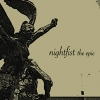 The immediate reaction I had to my first airing of this CD is probablyquite common: It's impossible, at first, to believe that this isgenuine. Thankfully, the intensity and craftsmanship of the music lenda great deal of credibility, and after repeat listens I am less andless inclined to challenge the band on whether or not their hearts aretruly in this. I grew up listening to Slayer, Anthrax, and Metallica,sporting the worst mullet on the planet and a backpatch on my denimjacket to strike fear into all those who opposed. As I grew older, Igot into Yes, Dream Theater, and even some King Crimson, and learnedhow expansive one could make rock sound. Nightfist have taken the worksof these and other collective metal and prog-rock influences andbettered them, even if only here and there on their first release. Iftheir bio is indeed true and Nightfist's members are recent high schoolgraduates, then color me doubly impressed, as there's not one slip-upis to be found in these louder-than-love anthemic passages, and thatkind of skill is rare on music so technically precise as this. Theprologue and epilogue come off a bit forced, like an afterthought,detailing the warrior's journey in two brief monologues; thankfullythey let the music do most of the talking. Furious drumming, blazingguitars and mad-scientist keyboards abound, and the songs take on alife of their own. I saw the warrior, put upon by so much strife,swinging his sword and crushing enemies with one blow, striving towardsthe final battle. The entire CD is a metaphor for this up and comingband, and at this rate they'll be the stuff of legends sooner ratherthan later.
The immediate reaction I had to my first airing of this CD is probablyquite common: It's impossible, at first, to believe that this isgenuine. Thankfully, the intensity and craftsmanship of the music lenda great deal of credibility, and after repeat listens I am less andless inclined to challenge the band on whether or not their hearts aretruly in this. I grew up listening to Slayer, Anthrax, and Metallica,sporting the worst mullet on the planet and a backpatch on my denimjacket to strike fear into all those who opposed. As I grew older, Igot into Yes, Dream Theater, and even some King Crimson, and learnedhow expansive one could make rock sound. Nightfist have taken the worksof these and other collective metal and prog-rock influences andbettered them, even if only here and there on their first release. Iftheir bio is indeed true and Nightfist's members are recent high schoolgraduates, then color me doubly impressed, as there's not one slip-upis to be found in these louder-than-love anthemic passages, and thatkind of skill is rare on music so technically precise as this. Theprologue and epilogue come off a bit forced, like an afterthought,detailing the warrior's journey in two brief monologues; thankfullythey let the music do most of the talking. Furious drumming, blazingguitars and mad-scientist keyboards abound, and the songs take on alife of their own. I saw the warrior, put upon by so much strife,swinging his sword and crushing enemies with one blow, striving towardsthe final battle. The entire CD is a metaphor for this up and comingband, and at this rate they'll be the stuff of legends sooner ratherthan later.  The Legendary Pink Dots might be the best-kept secret of the independent music scene. The band has been playing together for more than 20 years without a single brush with the mainstream, occupying a nebulous space between gothic rock, the avant-garde, progressive rock, the "esoteric" and psychedelic rock. Too goth for the indie fans and too rock for the apocalyptic folk, the Pink Dots have fallen into an odd little niche where few are familiar with them and even magazines like The Wire seem unaware of their existence. It is said that the best environment for artists to produce great work is one in which no one gives a damn, and this could certainly be true for the Pink Dots. Over the course of their career, they have produced a huge catalog of worthwhile music, much of it totally out of step with its time, and always shot through with boundless experimentation and amazingly original soundworlds.
The Legendary Pink Dots might be the best-kept secret of the independent music scene. The band has been playing together for more than 20 years without a single brush with the mainstream, occupying a nebulous space between gothic rock, the avant-garde, progressive rock, the "esoteric" and psychedelic rock. Too goth for the indie fans and too rock for the apocalyptic folk, the Pink Dots have fallen into an odd little niche where few are familiar with them and even magazines like The Wire seem unaware of their existence. It is said that the best environment for artists to produce great work is one in which no one gives a damn, and this could certainly be true for the Pink Dots. Over the course of their career, they have produced a huge catalog of worthwhile music, much of it totally out of step with its time, and always shot through with boundless experimentation and amazingly original soundworlds.
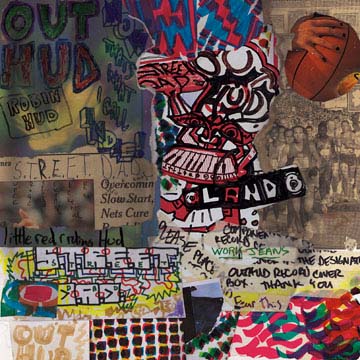 When I first saw Out Hud, they were playing to a crowd of Chicago's finest at the Fireside Bowl in the midst of an old-fashioned Midwestern heat wave. Two feelings prevailed that night, as the crowd anxiously awaited the headlining Locust to come on: the first was the "my god, I could not be more sweaty in this sauna of a club appropriately named the fireside" feeling. The second was the "I don't know who this band Out Hud is or why they are playing this show, but I guess it's cool" feeling. This second sentiment was actually voiced by Out Hud bassist (and !!! vocalist) Nic Offer himself in the banter between two songs. All the perspiring punks could have cared less why Out Hud were there; what mattered was that they were in fact there, and for a 40-minute set on a night when movement was excruciating, everyone forgot about the oppressive heat and started to dance and move and shake to this strange band whose music demanded that our bodies dance and move and shake, regardless of whether we wanted to or not.
When I first saw Out Hud, they were playing to a crowd of Chicago's finest at the Fireside Bowl in the midst of an old-fashioned Midwestern heat wave. Two feelings prevailed that night, as the crowd anxiously awaited the headlining Locust to come on: the first was the "my god, I could not be more sweaty in this sauna of a club appropriately named the fireside" feeling. The second was the "I don't know who this band Out Hud is or why they are playing this show, but I guess it's cool" feeling. This second sentiment was actually voiced by Out Hud bassist (and !!! vocalist) Nic Offer himself in the banter between two songs. All the perspiring punks could have cared less why Out Hud were there; what mattered was that they were in fact there, and for a 40-minute set on a night when movement was excruciating, everyone forgot about the oppressive heat and started to dance and move and shake to this strange band whose music demanded that our bodies dance and move and shake, regardless of whether we wanted to or not.
 This CD release of Nurse With Wound's compilation track collection LP from 1989 will not come as a surprise to any of the insane fans, who, like me, have already tracked down this material long ago and are very familiar with it. However, it's always nice when these works are given the CD treatment—often it means improved sound and extra tracks. Well, I can't detect any difference in sound from the LP edition. As for extras, the one bonus track, "New Dress," is not really that special, having already been issued (and still readily available) on the United Dairies edition of 'Crumb Duck,' the Stereolab collaboration. It is an awesome track, however, one of Stapleton's better ambient works. The tracks on 'Automating Vol 2' run the gamut of Stapleton's various styles. The first track "The Strange Play of the Mouth" is a good example: It begins with a woman singing, her voice being distorted and phased into psychedelic oblivion. Then the track suddenly shifts into an industrial drill attack along the lines of 'Thunder Perfect Mind', then the voice returns and is placed into a sound patchwork featuring old records and wacky sound manipulations a la 'Sylvie and Babs.' All in the span of eight minutes. "Elderly Man River/Dance of Fools" is a Jacques Berrocal-style free-jazz improvisation, with one of the most absurd takes on the old standard "Old Man River" that you will ever hear. The absurdity quickly segues into an aggressive Whitehouse noise attack, then a chorus of girls saying some deeply weird things about a hobby horse. "Lonely Poisonous Mushroom" (a collaboration with Organum) and "Lea Tantaaria" (renamed as "Wolfi") are eerie, atmospheric sound collages, featuring bell tones, randomly plucked guitars and nonsense piano. "Human, Human, Human" is my favorite on the album, utilizing the mutated sounds of a typewriter behind a truly odd New Age cult indoctrination record. A male and female speaker read a text aloud that is so full of psychobabble, twisted logic, and space cadet reasoning, it puts Heaven's Gate propaganda to shame. Although it's far from a great Nurse With Wound album, the variety of music on this disc might be a pretty good place for NWW novices to get an idea of the breadth and scope of Stapleton's oevre.
This CD release of Nurse With Wound's compilation track collection LP from 1989 will not come as a surprise to any of the insane fans, who, like me, have already tracked down this material long ago and are very familiar with it. However, it's always nice when these works are given the CD treatment—often it means improved sound and extra tracks. Well, I can't detect any difference in sound from the LP edition. As for extras, the one bonus track, "New Dress," is not really that special, having already been issued (and still readily available) on the United Dairies edition of 'Crumb Duck,' the Stereolab collaboration. It is an awesome track, however, one of Stapleton's better ambient works. The tracks on 'Automating Vol 2' run the gamut of Stapleton's various styles. The first track "The Strange Play of the Mouth" is a good example: It begins with a woman singing, her voice being distorted and phased into psychedelic oblivion. Then the track suddenly shifts into an industrial drill attack along the lines of 'Thunder Perfect Mind', then the voice returns and is placed into a sound patchwork featuring old records and wacky sound manipulations a la 'Sylvie and Babs.' All in the span of eight minutes. "Elderly Man River/Dance of Fools" is a Jacques Berrocal-style free-jazz improvisation, with one of the most absurd takes on the old standard "Old Man River" that you will ever hear. The absurdity quickly segues into an aggressive Whitehouse noise attack, then a chorus of girls saying some deeply weird things about a hobby horse. "Lonely Poisonous Mushroom" (a collaboration with Organum) and "Lea Tantaaria" (renamed as "Wolfi") are eerie, atmospheric sound collages, featuring bell tones, randomly plucked guitars and nonsense piano. "Human, Human, Human" is my favorite on the album, utilizing the mutated sounds of a typewriter behind a truly odd New Age cult indoctrination record. A male and female speaker read a text aloud that is so full of psychobabble, twisted logic, and space cadet reasoning, it puts Heaven's Gate propaganda to shame. Although it's far from a great Nurse With Wound album, the variety of music on this disc might be a pretty good place for NWW novices to get an idea of the breadth and scope of Stapleton's oevre.
samples:
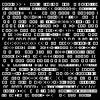 This is Jason Lescalleet's first full length release of studio produced material. I have known Jason's live tape-loopery for about four years and I deeply appreciate its visceral, human-organic quality and a gnarly expressiveness. With this background, 'Mattresslessness' came as a shock. The album opens with a sine tone composition in the Vainio/Ikeda style. I wonder why would this artist, whom I consider to have a truly rare and original talent, stoop to aping established artists? The next track seems to continue the pattern with a repetitive click pattern in the Nicolai style. The source of the third is harder to identify but it is also familiar: a noise collage, perhaps in the Lanz style? And so it goes on. I was, to say the least, bewildered and a somewhat concerned. However, after some head and chin scratching I put together a theory to answer this. With each piece being of a different character, the album covers a lot of space, touching on several well-established areas of endeavor in music, sound and noise. And these areas all have their well established masters. The European and Japanese masters, such as Lopez, Akita, Tietchens, Ikeda, Behrens, Nakajima et cetera, are able to turn out their quality set pieces with the apparent ease that Hayden did his symphonies, Mozart his concertos or Elton John his songs. All these masters were established as such through a combination of talent, PR, funding, and consistency; the aesthetic, political and financial aspects are all necessary; and it is fallacious to think that the former is sufficient. This CD sets out to challenge the essential authoritarianism inherent in this hierarchy. Jason, armed only with the aesthetic, moves into, by my count, nine different domains, turns the handle of the respective digital machine and shows us how the respective set pieces are constructed. He then proceeds to transcend each, exceeding the achievements of the masters, moving beyond the respective area's confines by adding acutely personal expression and original brilliance. The incendiary subtext is that the masters are false gods and the hierarchy itself is a false intellectual product of broken rationale. I'm not suggesting that Jason is challenging the validity or value of anyone's work; I don't think he is. I think he is taking aim at the authoritarian logic, so prevalent in Western culture, that bestows master status on a few and pretender status on the rest. Now then, with that theory of its intent in mind, how does the music sound? Actually it sounds wonderful. The sine tone piece descends into a gorgeous Eraserhead-sounding dreamscape, the metrical click patterns are transformed into scintillating diginoise only to emerge again fattened on a throbbing bed of bass, and the collage noise is run through the degenerative tape-loop process to make it good and sinister. My favorite piece, "Ineinandergreifen 08 Dezember 1912," has a melody that sounds like scraped or bowed metals on a 78 record that is then consumed by the tapes; degraded, subdued and eventually killed by an aging process to wrenching emotional effect. The whole album is immaculately turned out with excellent sound and tasteful packaging. Jason Lescalleet has exceeded himself. 'Mattresslessness' is a major achievement: brilliant music and a valid political message.
This is Jason Lescalleet's first full length release of studio produced material. I have known Jason's live tape-loopery for about four years and I deeply appreciate its visceral, human-organic quality and a gnarly expressiveness. With this background, 'Mattresslessness' came as a shock. The album opens with a sine tone composition in the Vainio/Ikeda style. I wonder why would this artist, whom I consider to have a truly rare and original talent, stoop to aping established artists? The next track seems to continue the pattern with a repetitive click pattern in the Nicolai style. The source of the third is harder to identify but it is also familiar: a noise collage, perhaps in the Lanz style? And so it goes on. I was, to say the least, bewildered and a somewhat concerned. However, after some head and chin scratching I put together a theory to answer this. With each piece being of a different character, the album covers a lot of space, touching on several well-established areas of endeavor in music, sound and noise. And these areas all have their well established masters. The European and Japanese masters, such as Lopez, Akita, Tietchens, Ikeda, Behrens, Nakajima et cetera, are able to turn out their quality set pieces with the apparent ease that Hayden did his symphonies, Mozart his concertos or Elton John his songs. All these masters were established as such through a combination of talent, PR, funding, and consistency; the aesthetic, political and financial aspects are all necessary; and it is fallacious to think that the former is sufficient. This CD sets out to challenge the essential authoritarianism inherent in this hierarchy. Jason, armed only with the aesthetic, moves into, by my count, nine different domains, turns the handle of the respective digital machine and shows us how the respective set pieces are constructed. He then proceeds to transcend each, exceeding the achievements of the masters, moving beyond the respective area's confines by adding acutely personal expression and original brilliance. The incendiary subtext is that the masters are false gods and the hierarchy itself is a false intellectual product of broken rationale. I'm not suggesting that Jason is challenging the validity or value of anyone's work; I don't think he is. I think he is taking aim at the authoritarian logic, so prevalent in Western culture, that bestows master status on a few and pretender status on the rest. Now then, with that theory of its intent in mind, how does the music sound? Actually it sounds wonderful. The sine tone piece descends into a gorgeous Eraserhead-sounding dreamscape, the metrical click patterns are transformed into scintillating diginoise only to emerge again fattened on a throbbing bed of bass, and the collage noise is run through the degenerative tape-loop process to make it good and sinister. My favorite piece, "Ineinandergreifen 08 Dezember 1912," has a melody that sounds like scraped or bowed metals on a 78 record that is then consumed by the tapes; degraded, subdued and eventually killed by an aging process to wrenching emotional effect. The whole album is immaculately turned out with excellent sound and tasteful packaging. Jason Lescalleet has exceeded himself. 'Mattresslessness' is a major achievement: brilliant music and a valid political message.
samples:
 This first full length release from Toronto-based multi-instrumentalist/producer Sandro Perri is a collection of two previously released 12" EPs (of very limited quantities) from his own Audi Sensa label with new interlacing compositions that sum up the title's concept. First off, an accompanying insert card in the Russian nesting doll-type of packaging provides textbook descriptions of four basic types breathing techniques (high, mid, low and complete) with there being a compositional collage to correspond and convey a sense of each one. The "breathing" tracks are generally comprised of subtle pulses, distant keyboard drones and washes of white noise with tremolo effects which could be heard as the equivalent of each individual style being translated by a high-end piece of music software. Previously released tracks such as "Acqua," "Rottura" and my personal fave "Riva" are somewhat more straight ahead in the style of a slightly funky deep house meets IDM, layered over what becomes the familiar elements throughout the course of listening. Perri handles the mixes of synths and samples with an exactness and still manages a nice, loose feel by adding some treated guitar and other stringed nuances to provide a more human quality. Spanning over forty-five minutes, the disc's eight tracks flow very agreeably, blending into each other so as not to leave you holding your breath.
This first full length release from Toronto-based multi-instrumentalist/producer Sandro Perri is a collection of two previously released 12" EPs (of very limited quantities) from his own Audi Sensa label with new interlacing compositions that sum up the title's concept. First off, an accompanying insert card in the Russian nesting doll-type of packaging provides textbook descriptions of four basic types breathing techniques (high, mid, low and complete) with there being a compositional collage to correspond and convey a sense of each one. The "breathing" tracks are generally comprised of subtle pulses, distant keyboard drones and washes of white noise with tremolo effects which could be heard as the equivalent of each individual style being translated by a high-end piece of music software. Previously released tracks such as "Acqua," "Rottura" and my personal fave "Riva" are somewhat more straight ahead in the style of a slightly funky deep house meets IDM, layered over what becomes the familiar elements throughout the course of listening. Perri handles the mixes of synths and samples with an exactness and still manages a nice, loose feel by adding some treated guitar and other stringed nuances to provide a more human quality. Spanning over forty-five minutes, the disc's eight tracks flow very agreeably, blending into each other so as not to leave you holding your breath.
samples:
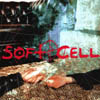 It's been a long time since 'This Last Night In Sodom' and to be honest, who would have thought they will ever come back with a new album. Rumors floated around for years, Marc Almond even mentioned it in his autobiography from 1999, and it's great that the finished product has finally materialized. Of course Soft Cell (like their audience) aren't screaming teenage TOTP stars any more. They've both grown through their solo work, Dave Ball most remarkable with The Grid and as producer and Marc Almond as, well Marc Almond.
It's been a long time since 'This Last Night In Sodom' and to be honest, who would have thought they will ever come back with a new album. Rumors floated around for years, Marc Almond even mentioned it in his autobiography from 1999, and it's great that the finished product has finally materialized. Of course Soft Cell (like their audience) aren't screaming teenage TOTP stars any more. They've both grown through their solo work, Dave Ball most remarkable with The Grid and as producer and Marc Almond as, well Marc Almond. "Darker Times" is a great opener and the only song co-written with Ingo Vauk, who co-produced this album with Dave Ball. The Marc Almond themes of love, passion, desire, and desperation are present in songs as "Last Chance" (the 'sequel to "Say Hello Wave Goodbye"' as announced on tour), "Together Alone", "Desperate" and the incredibly catchy "All Out Of Love," where Almond steps outside of his his favorite terrain and ventures into the familiarity of a sleazy secret world.
There are reflections about the modern lifestyle, the media sickness and the emotional and moral bankrupt: cynically sharp on in the albums preceding single (and video) "Monoculture," intense and dramatical on "Caligula Syndrome," cabaret-like on "Le Grand Guignol," and on the poppy dance tune, "Sensation Nation." Another Almond trademark, the self-reflective introspection, takes the shape of a sing-a-long tune, "Whatever It Takes," the story of somebody's mid-life crisis and the album ends on an up-note with an appropriately titled outro, "On an Up."
The weakest point of the album is the cover version of "The Night," another Northern Soul classic like "What" or "Where Did Our Love Go?" Musically, it's actually quite nice but I whish they had gone for something more daring. Soft Cell are able to push pop boundaries much further (as they proved often enough), but have played it safe with this tune (which is most likely to become the next single). The same could be said of this album, but maybe those are the effects of a 'matured' sound and slick production. Since so much time has passed, it's probably impossible for them to have met all the expectations of their fans. What we are left with is a fine album, one of this year's highlights, full of bouncy electronic pop songs, matched with superb lyrics which are more enjoyable with each listen.
samples:
 Recorded in Australia in 2001, this CD is further documentation of what is now a frequent collaboration. It's essentially an old-school guitar drone record, but with a modern, digital edge. The four tracks, which I'd guess were extracted from a single improvised session, add up to 45 minutes of reasonably novel dark ambience. Of dead-guitar godfather Rowe's techniques, those evident here include the use of a hand-held electric fan, brushing the strings of his guitar, and live radio mixing. As for Ambarchi's contributions, I'll admit to hoping for some of the fresher, emotionally neutral sounds of his breakthrough release 'Suspension'. But at least there's his trademark bell-tone drones and subtle use of digital effects. 'Flypaper' manages to construct an atmosphere that's undeniably engaging: the gently handled strings clunk and rattle in a concrete foreground narrative, in firm contrast to the thick, soupy drones beneath. The dynamic duo's dramatic improvisational timing also helps provide some oustanding moments. But nonetheless 'Flypaper' sounds a bit hackneyed. When we have Keith Whitman, Christian Fennesz, and Ambarchi himself proving that experimental guitar doesn't always have to be so grimly post-industrial, then even such an accomplished recording as this will sound like a blast from the early nineties.
Recorded in Australia in 2001, this CD is further documentation of what is now a frequent collaboration. It's essentially an old-school guitar drone record, but with a modern, digital edge. The four tracks, which I'd guess were extracted from a single improvised session, add up to 45 minutes of reasonably novel dark ambience. Of dead-guitar godfather Rowe's techniques, those evident here include the use of a hand-held electric fan, brushing the strings of his guitar, and live radio mixing. As for Ambarchi's contributions, I'll admit to hoping for some of the fresher, emotionally neutral sounds of his breakthrough release 'Suspension'. But at least there's his trademark bell-tone drones and subtle use of digital effects. 'Flypaper' manages to construct an atmosphere that's undeniably engaging: the gently handled strings clunk and rattle in a concrete foreground narrative, in firm contrast to the thick, soupy drones beneath. The dynamic duo's dramatic improvisational timing also helps provide some oustanding moments. But nonetheless 'Flypaper' sounds a bit hackneyed. When we have Keith Whitman, Christian Fennesz, and Ambarchi himself proving that experimental guitar doesn't always have to be so grimly post-industrial, then even such an accomplished recording as this will sound like a blast from the early nineties.
samples:
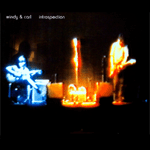 The limitations of the 7" single medium dictates that songs need to be brief and to-the-point. While this seems like a confining space to work in for a group who has a reputation for lengthy drones, Windy & Carl have actually been doing this for years. 'Introspection' is the first career-spanning evolutionary tour guide of the Dearborn duo, chronologically arranged in triplicate.
The limitations of the 7" single medium dictates that songs need to be brief and to-the-point. While this seems like a confining space to work in for a group who has a reputation for lengthy drones, Windy & Carl have actually been doing this for years. 'Introspection' is the first career-spanning evolutionary tour guide of the Dearborn duo, chronologically arranged in triplicate.
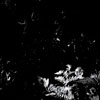 As part of Aaron Turner's (Isis, Greymachine, and Hydra Head Records) new Sige label, this split vinyl captures both the look and feel of classic noise LPs, right down to the hand-stamped labels and lo-fi inserts. The aesthetic carries over to the sound as well, with both artists contributing tracks that share a creepy, heavy sound that joins the best of metal and harsh noise.
As part of Aaron Turner's (Isis, Greymachine, and Hydra Head Records) new Sige label, this split vinyl captures both the look and feel of classic noise LPs, right down to the hand-stamped labels and lo-fi inserts. The aesthetic carries over to the sound as well, with both artists contributing tracks that share a creepy, heavy sound that joins the best of metal and harsh noise.
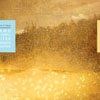 Functioning quite well as a current statement of what the 12k label is focusing on artistically, this disc features five artists associated with the label performing live from a recent Japanese tour, and the results showcase the variety and nuance of this niche of electronic music.
Functioning quite well as a current statement of what the 12k label is focusing on artistically, this disc features five artists associated with the label performing live from a recent Japanese tour, and the results showcase the variety and nuance of this niche of electronic music.



